

Events Leading to The American Revolution Webquest. You've heard about the American Revolution...
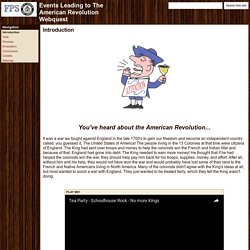
It was a war we fought against England in the late 1700's to gain our freedom and become an independent country called, you guessed it, The United States of America! The people living in the 13 Colonies at that time were citizens of England. The King had sent over troops and money to help the colonists win the French and Indian War and because of that, England had gone into debt. The King needed to earn more money! He thought that if he had helped the colonists win the war, they should help pay him back for his troops, supplies, money, and effort. Buckle your seat belt and get ready to travel to 1765!
Through the magic of 21st century technology, you are going to travel back in time to learn about what was going on in the 13 Colonies at this time! MA Curriculum Framework Connections: History and Geography: 2. 5.15 Explain British imperial policy, and the colonial response to these policies. A. B. C. D. English Language Arts 3. 7. 9. Writing: 1. "A Brief History of America's Independence: Part 1" (Revolutionary War) - 321... History Brief: The French and Indian War. The American Revolution. Liberty Kids - Watch All 40 Episodes For Free! Welcome: If you think an educational cartoon is an oxymoron, this excellent Emmy and Humanitas Award-nominated series just might change your mind... pound for pound, this 40-episode series does a better job of explaining the creation of the United States than most textbooks.
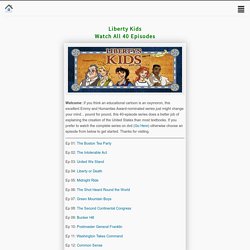
If you prefer to watch the complete series on dvd (Go Here) otherwise choose an episode from below to get started. Thanks for visiting. HELPFUL VIDEOS. Common Sense (pamphlet) Common Sense[1] is a pamphlet written by Thomas Paine in 1775–76 that inspired people in the Thirteen Colonies to declare and fight for independence from Great Britain in the summer of 1776.
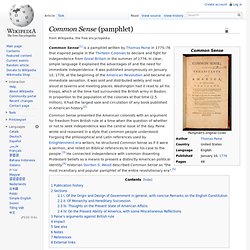
In clear, simple language it explained the advantages of and the need for immediate independence. It was published anonymously on January 10, 1776, at the beginning of the American Revolution and became an immediate sensation. It was sold and distributed widely and read aloud at taverns and meeting places. Washington had it read to all his troops, which at the time had surrounded the British army in Boston. Founding Fathers of the United States. Terminology[edit] Within the large group known as the "Founding Fathers", there are two key subsets, those who signed the Declaration of Independence in 1776 and those who framed the Constitution in 1787.
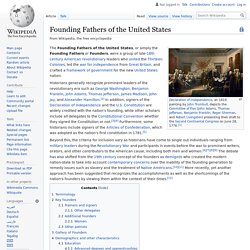
A further subset includes those who signed the Articles of Confederation.[1] Some historians define the "Founding Fathers" to mean a larger group, including not only the Signers and the Framers but also all those who, whether as politicians, jurists, statesmen, soldiers, diplomats, or ordinary citizens, took part in winning American independence and creating the United States of America.[2] Historian Richard B. Morris in 1973 identified the following seven figures as the key Founding Fathers: John Adams, Benjamin Franklin, Alexander Hamilton, John Jay, Thomas Jefferson, James Madison, and George Washington.[3] Three of these (Hamilton, Madison and Jay) were authors of the The Federalist Papers, advocating ratification of the Constitution.
Background[edit] Political experience[edit] American Revolution. The American Revolution was a political upheaval that took place between 1765 and 1783 during which colonists in the Thirteen American Colonies rejected the British monarchy and aristocracy, overthrew the authority of Great Britain, and founded the United States of America.
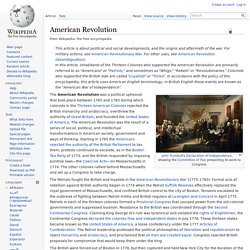
The American Revolution was the result of a series of social, political, and intellectual transformations in American society, government and ways of thinking. Starting in 1765 the Americans rejected the authority of the British Parliament to tax them; protests continued to escalate, as in the Boston Tea Party of 1773, and the British responded by imposing punitive laws—the Coercive Acts—on Massachusetts in 1774.
The other colonies rallied behind Massachusetts and set up a Congress to take charge. The Patriots fought the British and loyalists in the American Revolutionary War (1775–1783). Origins Background to 1763. Coming of the American Revolution: First Continental Congress. News of the Coercive Acts arrives in the colonies in the spring of 1774.

In response to the punitive measures outlined in the Boston Port Bill, Bostonians propose to cease all trade with Britain, as set forth in the Solemn League and Covenant. Haunted by the failure of earlier commercial resistance initiatives, the other twelve colonies (as well as most towns in Massachusetts) are wary of yielding to Boston's leadership. A colony-wide congress to discuss a united course of resistance emerges as a logical alternative. By July 1774, each of the American colonies (except Georgia, where elections are thwarted by the royal governor) has elected delegates to a "Grand Continental Congress.
" Massachusetts delegates John Adams, Samuel Adams, and Thomas Cushing begin their journey to Philadelphia on 10 August, surveying the political landscape and meeting fellow delegates along their route. The Congress does not publish any of its proceedings until after it has adjourned. First Continental Congress. First Continental Congress. Proceedings of the First Continental Congress The first Continental Congress met in Carpenter's Hall in Philadelphia, from September 5, to October 26, 1774.
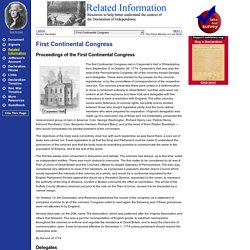
American Revolution: Boston Tea Party - Eyewitness Account. A Summary of the 1765 Stamp Act : The Colonial Williamsburg Official History & Citizenship Site. LP-Town_Hall_Meeting_sugaract-stampact.pdf. Intolerable Acts of 1774 *** Quartering Act of 1774 *** Background Info on the Quartering Acts - The 1686 Mutiny ActThe Mutiny Act was passed just after the Glorious Revolution as was the 1689 English Bill of Rights.
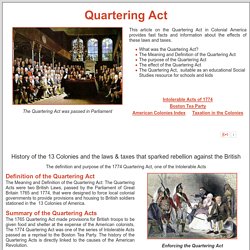
The Quartering Acts were extensions to the original 1686 Mutiny Act that, apart from dealing with mutiny in the British armed forces, also had clauses relating to standing armies and the billeting of British troops in barracks and public houses in the American colonies. The Quartering Acts were extensions of the original 1686 Mutiny Act. Read the 1774 Quartering Act text and words. Reasons for the Quartering Act of 1765 - Uncooperative ColonistsThe French Indian War (aka the Seven Years War 1754-1763)) was between France and Britain for possession of North America. During this time it is estimated that over 25,000 troops were sent from Britain to America. 1751 Currency Act. Home » Currency Act, Timeline of British Acts on America What was the Currency Act of 1751?
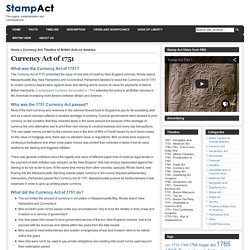
The Currency Act of 1751 prohibited the issue of new bills of credit by New England colonies: Rhode Island, Massachusetts Bay, New Hampshire and Connecticut. Parliament decided to enact the Currency Act of 1751 to control currency depreciation against silver and sterling and to ensure its value for payments of debt to British merchants. A Summary of the 1765 Stamp Act : The Colonial Williamsburg Official History & Citizenship Site. Sugar Act of 1764 *** Sugar Act - Background InformationThe Sugar Act was mainly about the manufacture of rum which was a highly lucrative product.
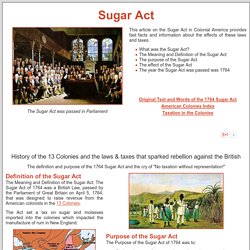
Rum is made from molasses, a by-product of sugar production. Some sugarcane was grown on sugar plantations in the colonies but the majority was imported from the West Indies. Digital History. Events Leading up to & The American Revolution for Kids (events leading up, f... The American Revolution. The American Revolution For many centuries colonists had been migrating from Europe to the Americas in search of economic opportunities and religious freedom. These colonies were established under the authority of the monarchs of Europe, and as a result, the colonists owed their loyalty to those monarchs. Life was difficult for the first settlers who came to the Americas. When they arrived, they found no cities, no paved streets, and no markets. The American Revolutionary War: Keeping Independence Part 1: The American Ind...
The American Revolutionary War: Keeping Independence Part 1: The American Independent Spirit The American Revolutionary War did not begin with the "Shot Heard 'Round the World" (the battles of Lexington and Concord). It had its roots in the very first settlements in North America. From the beginning, the American colonists were used to doing things their own way. Yes, they came from Great Britain, but Great Britain was a great many miles away.
This practice wasn't always popular with the British government. It is worth noting that American soldiers (including a young George Washington) did fight with British soldiers in the French and Indian War. And when the British-American side won that war, the Americans got to go back to their way of life as they knew it, with one important difference: The British government was very much in debt. American Revolution for Kids « Kids History: American Revolution. TV: Liberty`s Kids [DiC]